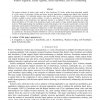Free Online Productivity Tools
i2Speak
i2Symbol
i2OCR
iTex2Img
iWeb2Print
iWeb2Shot
i2Type
iPdf2Split
iPdf2Merge
i2Bopomofo
i2Arabic
i2Style
i2Image
i2PDF
iLatex2Rtf
Sci2ools
118
click to vote
INFOCOM
2009
IEEE
2009
IEEE
Rateless Coding with Feedback
The erasure resilience of rateless codes, such as Luby-Transform (LT) codes, makes them particularly suitable to a wide variety of loss-prone wireless and sensor network applications, ranging from digital video broadcast to software updates. Yet, traditional rateless codes usually make no use of a feedback communication channel, a feature available in many wireless settings. As such, we generalize LT codes to situations where receiver(s) provide feedback to the broadcaster. Our approach, referred to as Shifted LT (SLT) code, modifies the robust soliton distribution of LT codes at the broadcaster, based on the number of input symbols already decoded at the receivers. While implementing this modification entails little change to the LT encoder and decoder, we show both analytically and through real experiments, that it achieves significant savings in communication complexity, memory usage, and overall energy consumption. Furthermore, we show that significant savings can be even achi...
Related Content
» LT Codes
| Added | 24 May 2010 |
| Updated | 24 May 2010 |
| Type | Conference |
| Year | 2009 |
| Where | INFOCOM |
| Authors | Andrew Hagedorn, Sachin Agarwal, David Starobinski, Ari Trachtenberg |
Comments (0)

